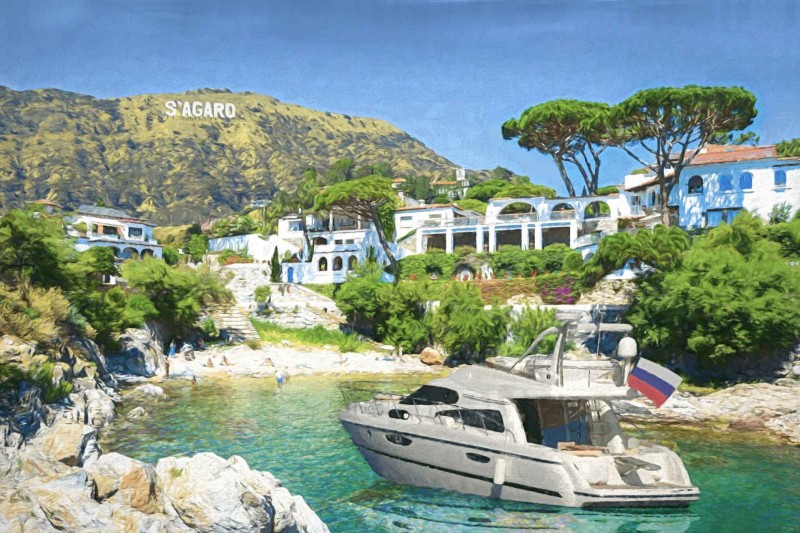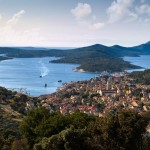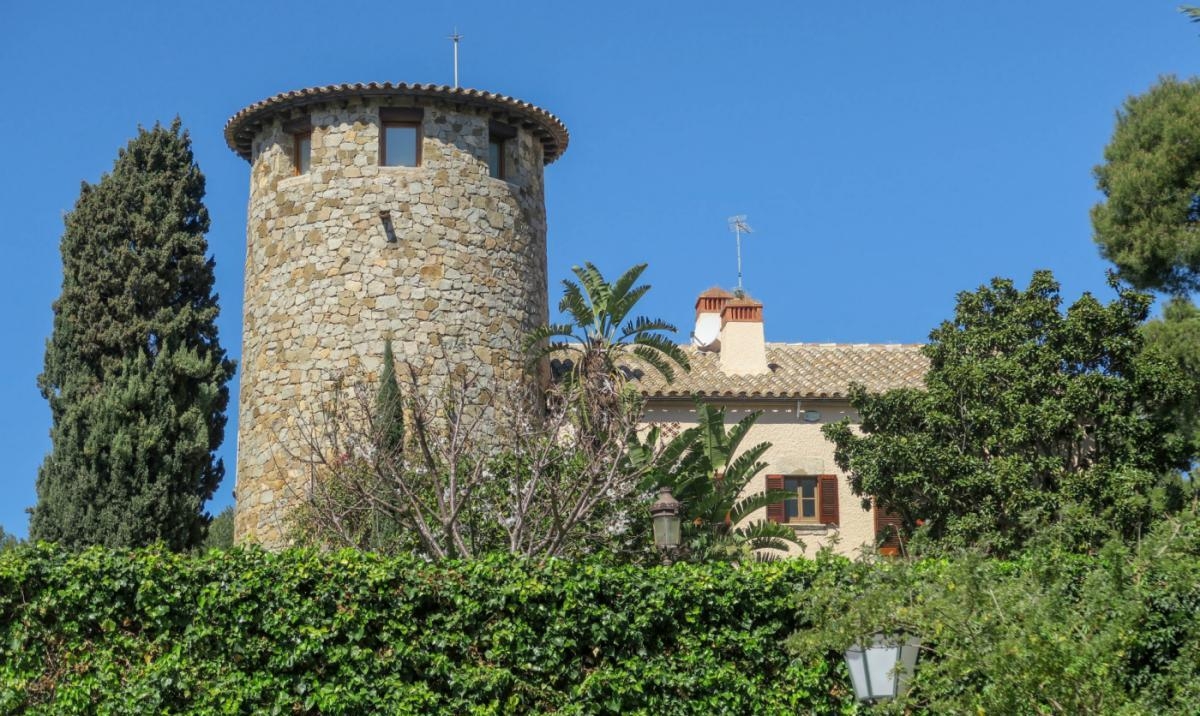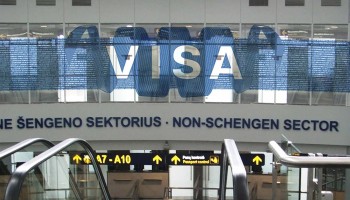Walking through the elite community of S‘Agaro along Spain’s rocky and beautiful Costa Brava coast, there’s a good chance of spotting someone famous.
Tourist guidebooks say the nearby Five Star Hostal de la Gavina was once a holiday spot for King Juan Carlos and many Hollywood movie stars. Dozens of luxury homes, many with pools, fill out the development that was started in the 1920s.
Today, only residents and guests can drive past the guard station to enter the exclusive village. Pedestrians can walk its streets, but there’s not much to see. There are no bars or restaurants, and most of the villas are hidden behind tall fences.
S’Agaro is still a playground for the rich, but now they’re actors from a different stage.
“About 70 percent of S’Agaro’s residents are Russians,” says a postman who works in the village.
Others offered a lower estimate, but emphasized the foreigners’ fabulous wealth.
“According to my estimates, Russians are not the majority here — about 10 to 15 percent,’’ said a real estate agent familiar with the community. “Everyone considers S’Agaro the place where Russians live, because the Russians’ houses are the largest and they’re the richest.”
Steven, a man who rents out real estate on AirBnB in nearby San Feliu de Guixols, said that the rich Russians spend their time on golf courses, in chic restaurants, or in their villas. And they’re not very open to socializing.
One rumor has it that Russian President Vladimir Putin or his daughters own a villa there. OCCRP couldn’t find any confirmation of this. But he has no shortage of friends in the area.
Reporters investigated S’Agaro while tracing transactions associated with the Troika Laundromat.
The Laundromat – recently uncovered by OCCRP and partners – is a scheme that allowed billions of dollars to flow out of Russia through a vast network of offshore companies between 2006 and 2013. Among other uses, the system enabled Russian elites to sidestep money transfer restrictions in place at the time, hide assets abroad, and launder money.
In Costa Brava, the Laundromat money led reporters to property that belongs to the son of Vladimir Artyakov, an influential Russian official and former governor of the Samara region. The properties were sold to the Artyakov family by an elderly woman, believed to be a relative, who had acquired them after receiving 14.7 million euros (US$22.7 million) in loans – requiring no collateral – from Laundromat companies.
Next door, reporters found another expensive property belonging to the stepdaughter of Sergei Chemezov, head of a massive state-owned enterprise, an old friend of Putin’s – and Artyakov’s boss. Though reporters found no direct Laundromat involvement in the family’s acquisition of the property, an investigation into the company that sold it shows previous, long-standing financial ties to companies set up by Troika Dialog – of which Chemezov has said he is a client.

Russians in Costa Brava
The transaction that led reporters to Costa Brava was certainly an unusual one.
On April 7, 2008, Anna Kurepina, an 80-year-old Russian woman, signed a loan agreement with Delco Networks, a company registered in the British Virgin Islands that was part of the Troika Laundromat system. Under the terms of the contract, Kurepina received 12.22 million euros ($19.1 million) from the company.
At the time, she was registered at the same Moscow apartment as Vladimir Artyakov, a well-connected official who was then also governor of Russia’s Samara region (and now works at Rostec, a state-owned defense and technology conglomerate). Circumstantial evidence suggests Kurepina is a close relative of Artyakov, though their exact relationship is unknown.
The large money transfers may have raised questions at Ukio Bankas, the Lithuanian bank where Delco, as well as other Laundromat companies, held their accounts. On April 10, 2008, Delco representatives sent the bank’s compliance department two documents: the loan agreement between Delco and Kurepina and a preliminary agreement for the purchase of property in S’Agaro. Presumably, the documents were meant to justify the purpose of the large transfers.
In August 2009, Kurepina received another 500,000 euros ($720,200) from Delco. That same October, she also got 2 million euros ($2.9 million) from Dino Capital, another Laundromat company. This brought her total loans to 14.7 million euros ($22.7 million).
Spanish land records confirm that Kurepina purchased property in S’Agaro in 2008. The records also show that she sold it to Artyakov’s son, Dmitry Artyakov, and his wife, Julia, in 2014.
The property Artyakov now owns contains two red-roofed, two-story villas.
The precise origins of the millions Kurepina received are unclear, since the Laundromat is designed precisely to obscure the origin of such transactions. But what’s clear is that she appears to have used money she received from the Laundromat to purchase elite Spanish properties that ended up belonging to Artyakov’s family.
Spanish anti-corruption prosecutors have begun an inquiry focused on Kurepina’s loans.
Artyakov did not respond to requests for comment; Kurepina could not be reached.
Artyakov’s Villas
Both of Dmitry Artyakov’s villas are surrounded by a dense hedge of tall pines, but there’s no fence or wall separating them.
The compound’s owner wasn’t home the day an OCCRP correspondent paid a visit, but local workers making repairs said that both buildings were owned by the same wealthy Russian, incorrectly describing him as the owner of Gazprom, the majority state-owned Russian oil giant.
Across the street, a worker said, pointing in the direction of a third villa, is the residence of “El Jefe” – Spanish for “the boss.”

“El Jefe”
El Jefe’s villa is reminiscent of a medieval fortress, featuring a round stone tower with small battlement windows that loom over its red-tiled roof. The home sits on a large plot of land – more than 6,000 square meters the Spanish land registry calls a “garden,” though most of it is paved with asphalt.
The worker’s reference to El Jefe is fitting. According to Spanish land records, the “castle” is owned by Anastasia Ignatova, the stepdaughter of Sergey Chemezov – who, as head of Rostec, is Artyakov’s boss.
Chemezov is also an old friend and colleague of Putin. (Like many in the president’s circle, he is under U.S. economic sanctions in connection with Russia’s aggression in Ukraine.)
In the 1980s, Chemezov and Putin both worked in the KGB’s Dresden headquarters in what was then the German Democratic Republic. They lived in the same apartment building, and their families became friendly as well.
In the 1990s, Chemezov headed the department of foreign economic relations for President Boris Yeltsin. At the time, Putin was deputy head of Yeltsin’s administration.
As Putin’s career took off, so did the careers of both Chemezov and Artyakov. Both men continued to advance as top managers of state-owned corporations. In 1999, Chemezov became the head of Promexport, a state arms exporter. Soon enough, Artyakov was brought on as his deputy.
In 2004, when Chemezov became general director of Rosoboronexport, a massive state-owned manufacturing conglomerate, Artyakov followed him there too. And after Chemezov became CEO of Rostec when it was created in 2007, Artyakov, who had been governor of the Samara region, once again became his deputy. That’s the position he still holds today.
As in Spain, the Artyakovs and Chemezovs are neighbors in Russia – in fact, twice over. They both own flats in an elite Moscow building near the city center and also share a property line in Akulinino, a posh mansion suburb where the six-hectare Chemezov property borders Artyakov’s five-hectare estate.
The relationship between the Chemezov and Artyakov families is now in its second generation. Artyakov’s son Dmitry once managed a hotel complex in the Russian resort town of Gelendzhik with Chemezov’s eldest son Stanislav, and is now in the hospitality business with his middle son, Alexander.
Meanwhile, Anastasia Ignatova – Chemezov’s stepdaughter, in whose name the third Spanish villa is registered – lectures at the Moscow State Institute of International Relations. She also gained fame in 2017 when she was selected to appear on the Pirelli tire company’s prestigious calendar. She was the only non-actress who modeled for the calendar, in the company of celebrities like Nicole Kidman and Helen Mirren. In fashion circles, there was speculation that a Pirelli joint venture with Rostec had influenced her selection, though photographer Peter Lindbergh has said that featuring Ignatova was his idea.
According to land records, Ignatova acquired her Spanish castle in 2017. She got a bargain, paying 2.9 million euros ($3.3 million) for a slice of paradise that real estate experts say is worth much more.
“I don’t think that the cost of this villa has fallen below 3 million euros even in the worst crisis years. Today this property is worth at least 15 million euros,” said Igor Indriksons, a Russian real estate investment manager who specializes in foreign property.
Chemezov did not respond to requests for comment. Ignatova could not be reached for comment.
Long-Standing Ties
Though Ignatova didn’t purchase her villa until 2017, there are indications that the company that previously owned it may have been connected to the Chemezovs many years earlier, before the family became as prominent in business as it is today.
That company, Societe Immobiliere Elsamex, is registered in Liechtenstein, and its bearer shares were issued in a way that guaranteed its owner almost complete anonymity.
According to Liechtenstein business records, Elsamex’s director until its 2018 liquidation was a woman from Cyprus named Katerina Iosif. She is the listed director of hundreds of corporations around the world, including at least five that were set up by Troika Dialog for its clients and at least four interconnected through numerous payments with the Troika Laundromat system.
And in a 2011 interview with the Moscow business daily Vedomosti, Chemezov said that he and his family were Troika Dialog clients.
Moreover, long-standing financial ties between Elsamex and the Troika Laundromat can be found in banking records dated years before the villa was sold to Ignatova: In 2006, Elsamex made a small payment to a core Laundromat company; the following year, a Laundromat company made two payments to a law firm and another firm on behalf of Elsamex. The purpose of the payments is unknown.
Finally, Elsamex and its director, Iosif, were represented in the real estate deal by Maria Baer Pakhomova, a Spanish citizen whose brother is reportedly Roman Pakhomov, general director of Avia Capital Service, a Rostec subsidiary. (Pakhomova is also listed as Kurepina’s representative in the contracts she signed to buy Spanish land.)
Elderly Entrepreneurs
Selling Spanish properties to the son of a senior Rostec official was not Kurepina’s only involvement with the state-owned company.
She and another pensioner, Lyudmila Rukavishnikova, 73, also managed to acquire several Rostec assets and appear to have used them to make money.
Like Kurepina, Rukavishnikova is not a random figure. In Moscow, she was registered at the same address as Chemezov’s wife, Ekaterina Ignatova, and her daughter, Anastasia. Based on this, as well as her social media posts, it is likely that she and Chemezov are close relatives.
One of the Rostec assets the two women acquired was a five-story Moscow business center, Spiridonovka 20, which had been owned by AvtoVAZ, a Rostec subsidiary. Judging from the financial records of the company that owned the building, as well as court records, it is possible that they received it nearly for free, though it had been purchased for $10 million in the early 2000s.
Though the building was never a major Rostec asset, it is valuable: Judging by real estate advertising of the Spiridonovka complex, the rental of its office space could earn over 60 million rubles ($1 million) per year.
In 2018, Rukavishnikova also acquired a company that owned shares in Rostec’s “Green Grove” sanatorium on the Black Sea in Sochi. The ownership transfer came after Rostec spent nearly 800 million rubles ($24.6 million) to restore the property for the 2014 Olympics.
Contacted by reporters, Chemezov and Artyakov did not respond to questions about how and why two elderly women acquired these Rostec assets and whether they were their relatives.
“Judging by the nature of the involvement of Rostec representatives in private projects, as well as the acquisition of properties belonging to subsidiaries of the state corporation by relatives of top managers, there is a feeling that the CEO and First Deputy at the State Corporation do not see a clear line between private and public business,” said Ilya Shumanov, Transparency International’s Deputy General Director in Russia.
“The intertwined structure of private and public is ample ground for conflicts of interest, abuse, and perhaps even loss of state property,” he said.
New Focus On Russia’s Dream Coast
The Chemezovs and Artyakovs are only part of what appears to be a larger Russian social circle in S’Agaro.
The family of the famous Russian obstetrician-gynecologist Mark Kurtser, as well as the family of the founder of Troika Dialog, Ruben Vardanyan, also visit the resort.
Kurtser’s son, Salomon, and his wife, Elena, have posted many photos from the area, as has Vardanyan’s daughter, Maria.
OCCRP was unable to locate any property owned by the two Moscow families, but three homes in the nearby village of Mas Nou are held by Suizo Properties, a Cyprus-based company established by Troika Dialog.
The Kurtser, Vardanyan, Chemezov, and Artyakov families are close. The younger children of Kurtser, Vardanyan, and Chemezov communicate on social networks and post joint photos from various cities and countries. And the fathers of the families and the older children do business together.
The heads of all four families are members of the hunters' and fishery union "Club Seasons" in Akulinino, a village outside Moscow. Chemezov, Vardanyan, and Kurtser also own a company in Moscow called NP Emergency Medical Services.
At the age of 22, Alexander Chemezov opened a private medical clinic with Kurtser in the Russian republic of Tatarstan. It was liquidated in 2011 due to bankruptcy.
Kurtser declined to comment for this story.
Vardanyan’s Troika Dialog also participated in consolidating AvtoVAZ shares to enable Rostec to acquire a controlling share. Renault, the French auto concern, later invested in the company.
An employee of the Maso Inmobiliaria, a local real estate agency, told OCCRP that the agency does not perform deep background checks on the people who buy real estate from them.
“For me it’s the same if they are officials or deputies. Yes, we still have to check the source of income. But we do it through notaries and banks,” the employee said, adding that clients are recommended to have their funds in a Spanish bank. This, he said, is a sufficient check of their origins.
Ironically, though Sergei Chemezov is one of Putin’s oldest friends, his family’s luxurious Spanish home isn’t far from the home of a family that Moscow considers its enemy.
In 2016, Spanish police arrested the son of the former mayor of Kyiv, Stepan Chernovetsky, in a nearby villa. The Spanish anti-corruption prosecutor's office reportedly suspects him of money laundering. In Russia, Chernovetsky and his son are personae non-gratae: In 2018, sanctions for “unfriendly actions” were introduced against them in connection with Russia’s conflict with Ukraine.
Additional reporting by Karina Shedrofsky









